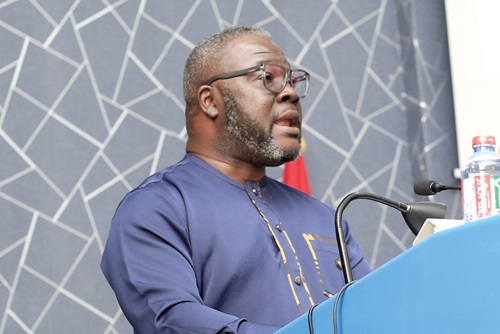[mc4wp_form id=”2320″]
African countries urged to enhance cybersecurity readiness
-
October 1, 2024
- Posted by: Evans Asare

Africa countries have been urged to take immediate steps to develop strategies to enhance the continent’s cybersecurity readiness.
The Minister of Communications and Digitalisation, Ursula Owusu-Ekuful, said Africa’s digital landscape had increasingly become a target for cyber criminals, who persisted in exploiting the continent’s vulnerabilities.
She said threats such as business e-mail compromise (BEC), phishing, banking trojans and stealers, crime-as-a service and cyber extortion, among others, were not only technical issues, but critical threats that posed existential risks to the national security and economic stability of the continent.
A 2023 Cybersecurity Ventures report indicates that cyber attacks occur every 39 seconds, a significant increase from the previous year.
This was contained in a speech read on behalf of the minister by the Director, International Affairs, Kwame Baah Acheamfuor, at this year’s Regional CyberDrill event in Accra yesterday.
Event
As a result, it was hosted by the Cyber Security Authority with an assembly of law enforcement agencies specializing in cybercrime investigations, senior ICT professionals and cybersecurity officials across the Africa region as participants.
Was jointly organised by the International Telecommunication Union (ITU) and INTERPOL, on the theme: “Bridging the gap, building the future.
It forms part of efforts to enhance cybersecurity readiness, protection and incident response capabilities of African countries.
Collaboration
The minister, therefore, said there was the need for African countries to leverage the power of regional collaboration and information sharing.
“As we delve into the statistics on cyber threats, it becomes clear that the urgency to strengthen our digital defences has never been greater,” she added.
The minister said that following the recent adoption of the UN Convention against cybercrime as a crucial framework for facilitating collaboration among nations, Ghana was set to launch its updated cybersecurity policy and strategy to secure digital infrastructure and deter cybercrime.
The strategy document, she said, had been approved by Cabinet and was expected to be unveiled in October, this year.
Approach
The Director-General of the Cyber Security Authority, Dr Albert Antwi-Boasiako, moreover, said with the continent experiencing an average of 2,372 cyber attacks per week in early 2024, there was a need for experts in the cybersecurity and digital transformation space to address those challenges head-on.
“A critical aspect of our approach is the relationship between incident response and international regulatory bodies.
“Effective incident response depends on coordinated efforts with these bodies to ensure rapid and efficient management of cyber threats,” he said.
Dr Antwi-Boasiako added that as part of efforts to guarantee regulatory compliance with the law and also streamline the process of providing services in accordance with approved standards in the country, his office had licensed a total of 1,433 registered cybersecurity professionals, 64 cybersecurity establishments and 246 cybersecurity service providers.
The Assistant Director of Cybercrime Operations at INTERPOL, Enrique Hernandez Gonzalez, said: “Just by working together, we can develop innovative solutions that not only address the current threats, but also anticipate and prepare us for future challenges.”
For his part, the Area Representative of the ITU Office for West Africa, Ali Drissa Badiel, stressed the need for countries to establish computer incident response teams, promote development of cybersecurity standards, and foster collaboration and information sharing
